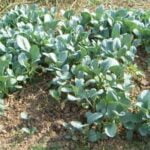Vermiculite is a popular additive used in gardening, but many gardeners have concerns about its safety when used in vegetable gardens. Understanding the controversy surrounding vermiculite and its potential risks and benefits is essential for making an informed decision about whether to use it in your own vegetable garden.
In this article, we will explore the question “Is vermiculite safe for vegetable gardens?” by delving into what vermiculite is, its various uses in gardening, and the potential risks and benefits of using it specifically in vegetable gardens.
Vermiculite is a naturally occurring mineral that has been mined and processed into a lightweight, absorbent material. It is often used as a soil amendment to improve drainage, moisture retention, and nutrient availability in gardening. However, concerns have been raised about the safety of using vermiculite in vegetable gardens due to its association with asbestos contamination.
In the following sections, we will examine both sides of the debate regarding the safety of vermiculite for vegetable gardens. We will discuss the potential risks associated with using contaminated vermiculite as well as the benefits of using clean, asbestos-free vermiculite.
Additionally, we will provide tips for safely using vermiculite in vegetable gardens and explore alternative options for those who may be wary of using it altogether. By weighing the evidence and understanding the facts, you can make an informed decision about whether vermiculite is suitable for your own vegetable garden.
What Is Vermiculite and Its Uses in Gardening
Vermiculite is a natural mineral that undergoes significant expansion when heated. It is commonly used in gardening as a soil amendment to improve drainage, aeration, and moisture retention. Vermiculite can also be used as a seed starting medium due to its lightweight nature and ability to promote healthy root growth.
In gardening, vermiculite acts as a sponge, holding water near the roots of plants. Its unique structure allows it to absorb nutrients and slowly release them back into the soil, making it an ideal component in potting mixes and garden soils.
Gardeners also use vermiculite for hydroponic growing systems where the medium needs to retain water but also offer good drainage and air flow around the roots of plants. With its multiple benefits for plant health, vermiculite has become widely popular in gardening practices.
- Improved soil structure
- Lightens heavy soils
- Retains moisture
- Aids in nutrient retention
As gardeners continue to seek out safe and effective methods for cultivating their vegetable gardens, the question “is vermiculite safe for vegetable gardens” becomes pertinent. The controversy surrounding this issue has sparked debate among experts and enthusiasts alike, leading many to question whether or not the benefits of using vermiculite outweigh any potential risks.
The Controversy
Vermiculite has been a popular additive for gardening for many decades. It is a natural mineral that is often used as a soil amendment to improve moisture retention, aeration, and drainage in gardens. However, the safety of using vermiculite in vegetable gardens has been a topic of controversy among gardeners and scientists alike.
Health Concerns: Asbestos Contamination
One of the main reasons for the debate over vermiculite’s safety in vegetable gardens is the potential contamination with asbestos. Asbestos is a known carcinogen, and some vermiculite deposits have been found to contain trace amounts of asbestos fibers. When vermiculite contaminated with asbestos is used in vegetable gardens, there is a risk that these harmful fibers could be ingested through consumption of the vegetables grown in the soil.
Research Findings and Regulations
Several studies have been conducted to assess the safety of using vermiculite in gardening, including vegetable gardens. The Environmental Protection Agency (EPA) has also provided guidelines for safe use of vermiculite, especially in areas where asbestos contamination may be present. Research findings have shown that while there is a potential risk of asbestos exposure from using certain vermiculite products, not all vermiculite is contaminated with asbestos.
Making an Informed Decision
When considering whether vermiculite is safe for use in vegetable gardens, it’s important for gardeners to understand the potential risks and benefits. It’s recommended to only use vermiculite that has been tested and certified as asbestos-free for vegetable gardening.
Additionally, taking precautions such as wearing gloves and masks when handling vermiculite can minimize any potential exposure to harmful substances. Ultimately, making an informed decision about using vermiculite in your vegetable garden involves weighing the potential risks against the benefits it can provide for healthy plant growth.
Understanding the Risks and Benefits of Using Vermiculite in Vegetable Gardens
Vermiculite is a naturally occurring mineral that is often used in gardening as a soil amendment to improve moisture retention and aeration. It is lightweight and has excellent water retention properties, making it a popular choice for gardeners looking to improve the quality of their soil. However, the question of whether vermiculite is safe for vegetable gardens has been the subject of much debate and controversy.
One of the main concerns surrounding the use of vermiculite in vegetable gardens is the potential presence of asbestos. In its natural state, vermiculite may contain asbestos fibers, which can pose serious health risks if inhaled. However, not all vermiculite products contain asbestos, and manufacturers are now required to test for the presence of asbestos before selling it for consumer use.
In addition to concerns about asbestos, there is also debate about whether vermiculite may contain harmful metals such as lead or mercury. Like many minerals, vermiculite can naturally contain trace amounts of heavy metals.
When used in vegetable gardens, these metals have the potential to be taken up by plants and end up in the food supply. However, research on this topic has produced mixed results, with some studies suggesting that the levels of heavy metals in vermiculite are too low to pose a significant risk to human health.
Overall, when considering whether to use vermiculite in your vegetable garden, it’s important to weigh the potential risks against the benefits. Vermiculite can greatly improve soil structure and water retention, leading to healthier plants and higher yields. However, if you are concerned about potential contaminants in vermiculite, there are alternative soil amendments available that can provide similar benefits without posing potential risks.
| Risks | Benefits |
|---|---|
| Potential presence of asbestos | Improved soil structure and water retention |
| Trace amounts of heavy metals | Healthier plants and higher yields |
Tips for Safely Using Vermiculite in Vegetable Gardens
Vermiculite is a popular gardening material due to its ability to improve soil aeration, moisture retention, and nutrient retention. However, there has been some controversy over whether vermiculite is safe for use in vegetable gardens. Despite this controversy, many expert gardeners and horticulturists believe that vermiculite can be used safely in vegetable gardens when certain precautions are taken.
Here are some tips for safely using vermiculite in your vegetable garden:
1. Use certified asbestos-free vermiculite: When purchasing vermiculite for your vegetable garden, make sure to look for a trusted brand that provides vermiculite that is certified to be free of asbestos. Asbestos contamination was an issue in the past with some vermiculite products, so it’s crucial to ensure that the product you are using is safe.
2. Wear protective gear when handling vermiculite: To minimize any potential risks associated with handling vermiculite, it’s essential to wear protective gear such as gloves and a mask while using it in the garden. This can help prevent any inhalation or skin contact with potential contaminants.
3. Limit exposure and follow best practices: When using vermiculite in your vegetable garden, try to limit your exposure by avoiding creating dust from the material. Also, ensure that you wash your hands thoroughly after working with vermiculite and before eating or drinking anything.
By following these tips, you can safely use vermiculite in your vegetable garden without putting yourself or your plants at risk.
Alternatives to Vermiculite for Vegetable Gardens
Perlite
Perlite is a popular alternative to vermiculite in vegetable gardens. Like vermiculite, perlite is a mineral that undergoes processing to expand its volume. It is lightweight and has excellent drainage properties, making it an ideal addition to soil mixes for vegetable gardening. Perlite also helps improve aeration and water retention in the soil, promoting healthy root growth for vegetables.
Coconut Coir
Coconut coir, also known as coconut pith or coco peat, is another natural alternative to vermiculite. It is a byproduct of coconut processing and is known for its excellent water retention and moisture-absorbing properties. Coconut coir can be used as a soil amendment in vegetable gardens to improve the moisture-holding capacity of the soil and enhance root development.
Rice Hulls
Rice hulls are an organic alternative to vermiculite that can be used in vegetable gardens. They are lightweight, have good drainage properties, and can improve soil aeration when mixed into the soil. Rice hulls also break down slowly, adding organic matter to the soil over time.
Case Studies and Research Findings on the Safety of Vermiculite in Vegetable Gardens
Vermiculite is a popular gardening material that is used to improve soil aeration and water retention. It is a natural mineral that has been heated to high temperatures, causing it to expand into lightweight particles. Vermiculite is commonly used in potting mixes and as an amendment for soil in both flower and vegetable gardens.
Research on the safety of vermiculite for use in vegetable gardens has produced varying results. Some studies have shown that vermiculite may contain asbestos fibers, which can pose serious health risks when inhaled. However, other research indicates that the risk of asbestos exposure from vermiculite is minimal when using commercial-grade products. Although the debate continues, the general consensus among experts is that the risk of asbestos exposure from vermiculite used in gardening is low.
A study conducted by the Environmental Protection Agency (EPA) found that while some vermiculite products were contaminated with asbestos, commercial-grade vermiculite typically does not contain significant levels of asbestos. This suggests that as long as gardeners use commercially available vermiculite products from reputable sources, the risk of exposure to harmful levels of asbestos is minimal.
Additionally, research has shown that using proper precautions such as wearing protective masks when handling vermiculite further reduces any potential risk. According to experts, the benefits of using vermiculite in vegetable gardens, such as improved soil structure and moisture retention capabilities, outweigh the potential risks associated with its use.
| Study/Case | Findings |
|---|---|
| EPA Research | Commercial-grade vermiculite usually contains minimal levels of asbestos |
| Expert Consensus | The benefits of using vermiculite outweigh potential risks when proper precautions are taken. |
Conclusion
In conclusion, the question of whether vermiculite is safe for vegetable gardens is a complex issue with both risks and benefits to consider. While vermiculite can be a valuable addition to your garden soil, it is important to understand the potential health risks associated with its use. By considering the information provided in this article, you can make an informed decision about whether or not to use vermiculite in your vegetable garden.
It is clear that vermiculite offers many benefits for vegetable gardens, including improved soil aeration, water retention, and nutrient availability. However, it is equally important to recognize the potential health hazards associated with asbestos contamination in some sources of vermiculite. By following the tips for safely using vermiculite in your garden and considering alternative options, you can mitigate these risks and enjoy the benefits of this versatile gardening additive.
Ultimately, the safety of using vermiculite in your vegetable garden depends on understanding and weighing the potential risks and benefits. By staying informed about research findings and case studies on the safety of vermiculite in vegetable gardens, you can make a decision that aligns with your gardening philosophy and values. Always remember to prioritize safety and make choices that are best for you, your family, and the environment.
Frequently Asked Questions
Should I Use Vermiculite in My Vegetable Garden?
Using vermiculite in your vegetable garden can be beneficial for improving soil aeration, moisture retention, and nutrient availability. It also helps lighten heavy soils and provides a good environment for root growth.
Is Vermiculite Safe in the Garden?
Vermiculite is generally considered safe to use in the garden. It is a naturally occurring mineral that has been used in gardening for many years. As long as it is used according to instructions, there should be no safety concerns.
Is Vermiculite Good for Tomatoes?
Vermiculite can be good for tomatoes as it helps with water retention, preventing soil compaction, and allowing the roots to access nutrients more easily. It can also aid in preventing diseases often associated with waterlogged soil.

If you’re looking to get into vegetable gardening, or are just looking for some tips on how to make your current garden better, then you’ve come to the right place! My name is Ethel and I have been gardening for years. In this blog, I’m going to share with you some of my best tips on how to create a successful vegetable garden.





